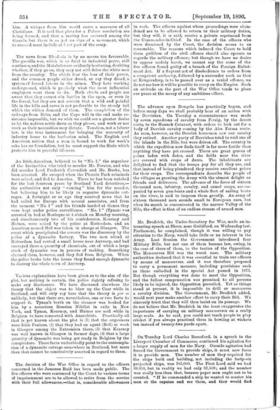The news from Rhod e sia is by no means too favourable.
The guerilla war, which is so fatal to industrial peace, still continues, and the Matabeles are evidently hesitating, doubting whether, if they go on, they may not still drive the white men from the country. The chiefs fear the loss of their power, and the common people either dread, or say they dread, a system of forced labour in the mines. They hate working underground, which is precisely what the most influential employers want them to do. Both chiefs and people are aware that they cannot win battles in the open, or even in the forest, but they are not certain that a wild and painful life in the hills and caves is not preferable to the steady toil which the whites demand of them. The completion of the railways from Beira and the Cape will in the end make re- sistance impossible, but we wish we could see a greater desire to let the natives settle down as they please, and work or not work as their necessities may dictate. Taxation, not a labour law, is the true instrument for bringing the necessity of industry home to the barbarian mind. The English and American notion that a man is bound to work for work's sake has no foundation, but he must support the State which protects him in peaceful idleness.


































 Previous page
Previous page